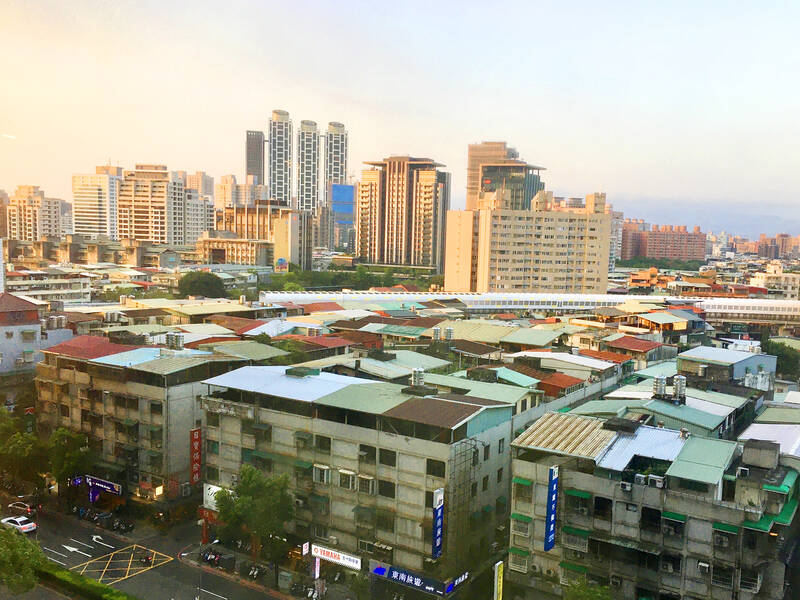More than 40 percent of buildings in Taipei do not have elevators, Ministry of the Interior data show on its Real Estate Information Platform.
Critics say that this situation creates problems for seniors, especially in an aging society.
Tax registration certificates show that there are about 928,000 buildings in Taipei. Among them, 391,200 are four or five-story residential buildings, or about 43 percent.

Photo: Hsu Yi-ping, Taipei Times
The proportion is rising every year, real-estate brokerages said.
More than 52 percent of the buildings in the city are three to five floors, and almost half of Taipei’s residential buildings are estimated to not have elevators.
Four-story and five-story buildings in the city are mostly residential buildings without elevators, and those with fewer than four floors are bungalows, houses or villas, which also usually require residents to use stairs, real-estate brokerages said.
Taiwan in 2018 became an aging society — one in which more than 14 percent of the population is 65 or older, making Taipei housing conditions increasingly difficult for the elderly, they said.
Some people as they age might develop increased reluctance to leave home if they are on an upper floor with no elevator, they added.
It is unknown whether urban renewal projects proposed by Taipei mayor-elect Chiang Wan-an (蔣萬安) address the problem, they said.
Meanwhile, about 649,300 buildings in Taipei are more than 30 years old, accounting for about 70 percent of the city’s buildings, with the average age being 37 years, ministry data showed.
Only 25,000 buildings were built within the past five years, accounting for fewer than 3 percent, indicating a slow pace of development.
Local election candidates often promise reconstruction of older homes, real-estate analyst Ho Shih-chang (何世昌) said.
However, “everyone knows that it is very difficult for governments to intervene in private urban renewal projects,” so election platforms tend to only focus on public projects, he said.
Sinyi Realty Inc research manager Tseng Ching-der (曾敬德) said that residences in Taipei’s alleys were built nearly 40 years ago when the city was developing rapidly.
As many are now deteriorating, they have become an urgent problem for the newly elected Taipei city council and mayor, he added.

Taiwan has received more than US$70 million in royalties as of the end of last year from developing the F-16V jet as countries worldwide purchase or upgrade to this popular model, government and military officials said on Saturday. Taiwan funded the development of the F-16V jet and ended up the sole investor as other countries withdrew from the program. Now the F-16V is increasingly popular and countries must pay Taiwan a percentage in royalties when they purchase new F-16V aircraft or upgrade older F-16 models. The next five years are expected to be the peak for these royalties, with Taiwan potentially earning

STAY IN YOUR LANE: As the US and Israel attack Iran, the ministry has warned China not to overstep by including Taiwanese citizens in its evacuation orders The Ministry of Foreign Affairs (MOFA) yesterday rebuked a statement by China’s embassy in Israel that it would evacuate Taiwanese holders of Chinese travel documents from Israel amid the latter’s escalating conflict with Iran. Tensions have risen across the Middle East in the wake of US and Israeli airstrikes on Iran beginning Saturday. China subsequently issued an evacuation notice for its citizens. In a news release, the Chinese embassy in Israel said holders of “Taiwan compatriot permits (台胞證)” issued to Taiwanese nationals by Chinese authorities for travel to China — could register for evacuation to Egypt. In Taipei, the ministry yesterday said Taiwan

Taiwan is awaiting official notification from the US regarding the status of the Agreement on Reciprocal Trade (ART) after the US Supreme Court ruled US President Donald Trump's global tariffs unconstitutional. Speaking to reporters before a legislative hearing today, Premier Cho Jung-tai (卓榮泰) said that Taiwan's negotiation team remains focused on ensuring that the bilateral trade deal remains intact despite the legal challenge to Trump's tariff policy. "The US has pledged to notify its trade partners once the subsequent administrative and legal processes are finalized, and that certainly includes Taiwan," Cho said when asked about opposition parties’ doubts that the ART was

If China chose to invade Taiwan tomorrow, it would only have to sever three undersea fiber-optic cable clusters to cause a data blackout, Jason Hsu (許毓仁), a senior fellow at the Hudson Institute and former Chinese Nationalist Party (KMT) legislator, told a US security panel yesterday. In a Taiwan contingency, cable disruption would be one of the earliest preinvasion actions and the signal that escalation had begun, he said, adding that Taiwan’s current cable repair capabilities are insufficient. The US-China Economic and Security Review Commission (USCC) yesterday held a hearing on US-China Competition Under the Sea, with Hsu speaking on